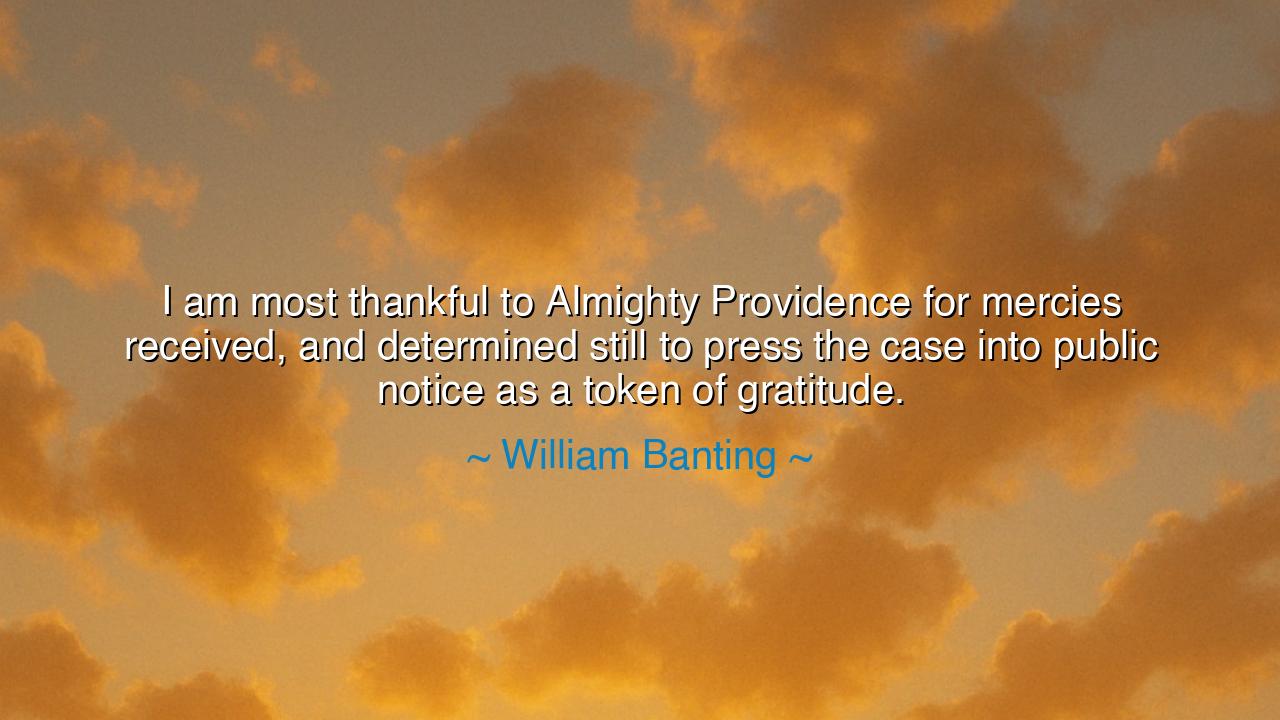
I am most thankful to Almighty Providence for mercies received
I am most thankful to Almighty Providence for mercies received, and determined still to press the case into public notice as a token of gratitude.






William Banting, a man once afflicted by the burdens of body and spirit, proclaimed with solemn humility: “I am most thankful to Almighty Providence for mercies received, and determined still to press the case into public notice as a token of gratitude.” These words, born from the depths of personal struggle, are not merely the utterances of one who found relief, but the vow of a soul who has tasted redemption and seeks to share it with the world. In them we hear echoes of ancient wisdom—that when mercy is given, gratitude must not remain silent, but must transform into action for the good of others.
Banting, known as the pioneer of the first widely recognized low-carbohydrate diet, once battled the heavy chains of obesity. His life was constricted, his health endangered, his steps wearied under the weight of flesh and despair. Yet in time he discovered a way of eating that brought him back to vigor, to freedom, to life renewed. To him this was not a mere chance, nor simply the fruit of human science, but the mercy of Providence. And thus, his gratitude was not quiet reflection but public proclamation—he pressed his “Letter on Corpulence” into the hands of society, hoping that others, too, might share in the gift he had received.
The ancients would have recognized in Banting’s words the noble duty of one who has been spared. For when Aeneas was delivered from Troy’s burning ruins, he did not hide his survival but carried the flame of his people to found a new nation. When Job, after long suffering, was restored by the hand of God, he bore witness to divine mercy with reverent testimony. So too Banting: once bound by suffering, once delivered by mercy, he sought to turn his personal salvation into a beacon for others. His thankfulness was not selfish—it was a force that propelled him to act.
His phrase, “press the case into public notice,” reveals a profound truth. Gratitude that remains hidden dies with the one who holds it, but gratitude expressed multiplies, healing and guiding others. Banting did not owe it to himself to speak—he owed it to those who still suffered, who still searched for deliverance. In this way, he teaches us that true thankfulness is never passive; it is active, outward-looking, and generous.
History is filled with such examples. Consider Florence Nightingale, who, after surviving sickness and hardship, devoted her life to nursing and reform, pressing the case of health into public notice so that countless lives might be spared. She, too, saw her recovery and insight as a mercy not to be hoarded but to be poured out for the world. In their lives we see the same principle: gratitude is not only a prayer whispered to heaven, but also a duty carried out on earth.
At the heart of Banting’s declaration lies the sacred union of gratitude and service. To be thankful is not merely to feel blessed—it is to live as a blessing to others. Gratitude is not content with silence; it demands testimony. Gratitude does not accept comfort alone; it demands that comfort be shared. By turning his personal healing into a message for all, Banting shows us that thankfulness matures into its highest form when it bears fruit for the common good.
The lesson for us is clear: when you are delivered from hardship, do not hide your story. Speak it, share it, let your gratitude become a guidepost for others who still wander in darkness. To remain silent is to keep mercy chained; to proclaim it is to let mercy ripple outward into eternity. Like Banting, be thankful to Providence not only with words, but with deeds that uplift others.
Practical action flows easily from this wisdom: keep record of your mercies, write them, tell them, share them. If you have found healing, help others find it. If you have discovered truth, pass it on. Let gratitude become your fuel for service, your testimony to Providence, your offering to the world. For as William Banting shows us, to be thankful is to act, to act is to bless, and to bless is to honor the mercy that first saved you.






AAdministratorAdministrator
Welcome, honored guests. Please leave a comment, we will respond soon